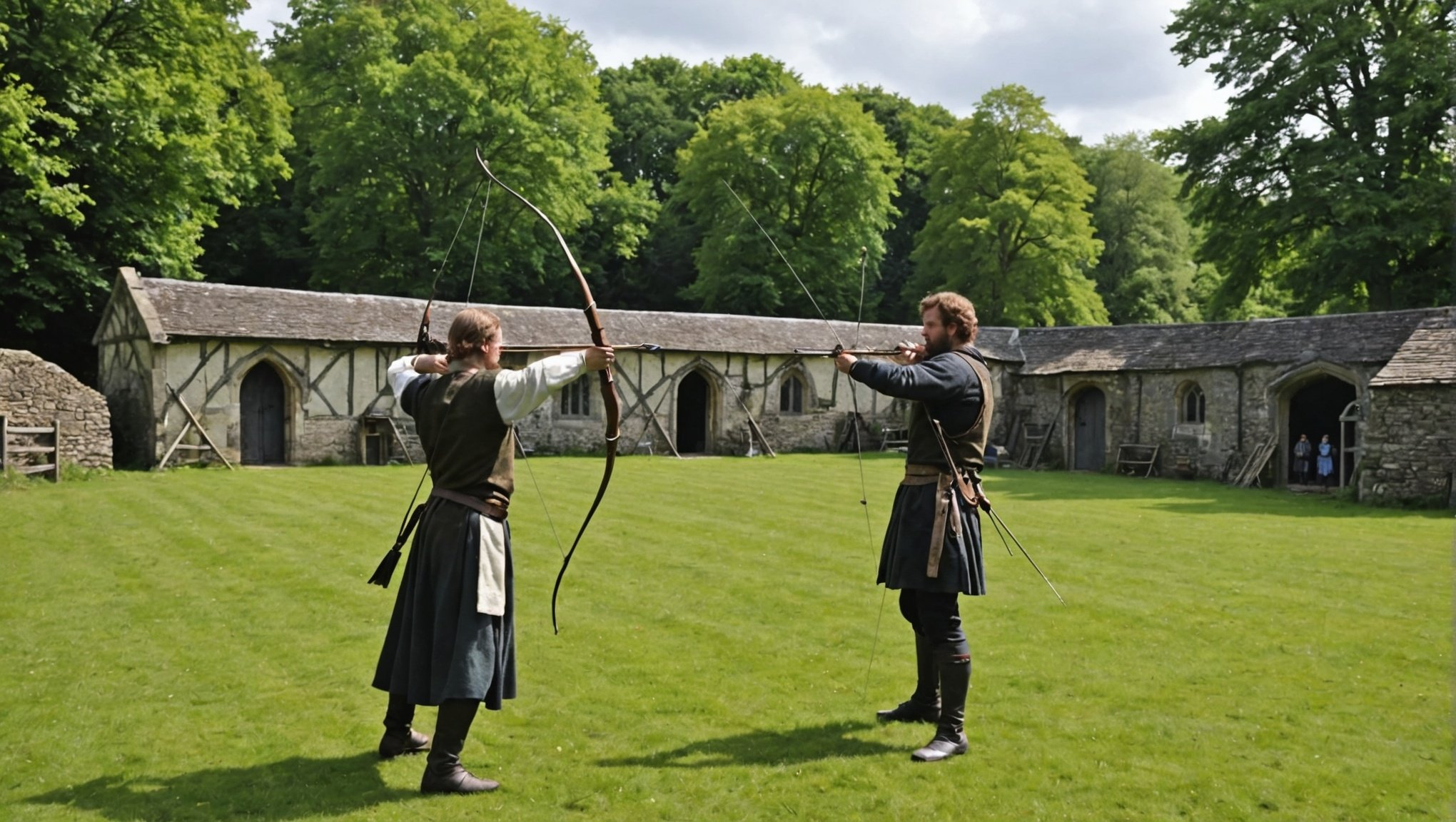Overview of Medieval Archery in the UK
Medieval archery played a crucial role in shaping historical events within the UK. Archers were pivotal during battles, with the bow seen as a symbol of both survival and military prowess. Over the centuries, historical archery practices evolved significantly. Initially, the longbow was the favoured weapon due to its range and simplicity, becoming iconic during the Hundred Years’ War. As metallurgy advanced, the crossbow emerged, offering increased power and requiring less skill to operate.
The evolution of archery also impacted medieval society beyond warfare. It was a popular pastime, with archery competitions becoming a staple within communities across the UK. These gatherings were not only a display of skill but also fostered camaraderie and social integration.
In the same genre : Discover the Top Coastal Hiking Trails Across the UK: Your Ultimate Guide to Scenic Walks
Today, the cultural legacy of medieval archery continues through UK archery workshops and events that keep this ancient tradition alive. Enthusiasts and historians alike participate in these workshops, experiencing the craftsmanship of arrow making and practising the refined techniques of bygone eras. Such activities make medieval archery not just a historical footnote but a living practice with ongoing relevance and appeal. These workshops help bridge the gap between past and present, celebrating the rich tapestry of historical archery.
Top Locations for Medieval Archery Workshops
When it comes to selecting the prime archery workshops, several criteria are pivotal. Enthusiasts should prioritize workshops offering authentic settings and expert instruction to maximize the experience. Workshops hosted in historic locales with ties to the medieval period can provide an enriched learning environment, enhancing the authenticity and fun.
In parallel : Discover Traditional British Baking Classes: Where to Join the Culinary Adventure!
In the UK, notable regions offer prestigious workshops locations that blend culture with skill. The Midlands often stands out with its picturesque landscapes and a rich history in medieval arts. Also, the Scottish Highlands are famed for their grandeur and the traditional craftsmanship of their workshops. Many attendees find workshops in such areas incredibly immersive due to their deep-rooted historical significance.
These medieval skill workshops come in a variety of settings, from majestic castles to quaint rural landscapes. Touring the grounds of a castle can transport participants to another time, where they can envision themselves as part of the medieval era. Meanwhile, sessions in rural landscapes offer a peaceful environment ideal for focused practice. Each location provides distinct advantages, ensuring a unique experience for learners at every session.
Workshop Experiences and Skills Taught
Participating in workshop experiences centered around archery equips individuals with an array of archery skills. These sessions are designed to facilitate skill development and provide insights into authentic archery techniques.
Skills Developed in Workshops
In these workshops, participants learn crucial skills such as proper bow handling, precise aiming, and effective shooting techniques. These skills are foundational for anyone keen on mastering archery. Emphasis is placed on accuracy and confidence, helping participants improve their consistency and form.
Types of Equipment Used
Workshops introduce a variety of traditional bows and arrows. Understanding the characteristics of different bow types and their uses enhances the overall archery experience. Participants gain hands-on experience with various arrows, learning their specific roles in sport or practice settings.
Overview of Workshop Activities
The workshops are replete with practice-oriented activities. Sessions often begin with warm-up games designed to engage and prepare participants. Competitions may follow, encouraging friendly rivalry and promoting skill enhancement through practical application. These elements ensure that learning is both engaging and physically stimulating, paving the way to becoming adept in authentic archery techniques.
Historical Context of Medieval Archery
In the world of medieval warfare, archery played a pivotal role, shaping battles and evolving as a strategic asset. Archers were not just foot soldiers; they were a crucial component of armies, often defining the outcome of conflicts. The history of archery in this period reveals a deep reliance on skill and precision, both of which were critical in penetrating enemy defenses.
Training was intensive and began at a young age. Masters taught aspiring archers the techniques needed to nock an arrow with speed and accuracy. This rigorous training ensured that by the time an archer joined the battlefield, their skills were razor-sharp and battle-ready.
Moreover, medieval practices in archery laid a foundation that influenced modern techniques. Many of today’s archery techniques, such as consistent posture and controlled breathing, have origins dating back to medieval times. These practices highlight how the historical roots of archery have shaped contemporary methods.
Archery’s role transcended mere combat; it was also a sport, fostering competition and enhancing skills. This dual role in medieval society ensured its place as a celebrated tradition both then and now.
User Reviews and Testimonials
Exploring user experiences provides valuable insights into the real-world impact of our archery workshops. Participants have shared a wealth of feedback, offering a blend of positive and constructive critiques. Their stories reflect diverse perspectives, enabling us to enhance the learning experience comprehensively.
Positive Experiences
Many reviews highlight overwhelming satisfaction. Users frequently describe workshops as engaging and informative. From seasoned archers to beginners, most testimonials appreciate the expert instructors and the supportive environment. A participant noted the joy of mastering new techniques, feeling encouraged by the instructors’ patience. The sense of community among participants also emerged as a common theme in feedback, with users finding camaraderie and encouragement from peers.
Constructive Critiques
While the general feedback is positive, constructive critiques pinpoint areas for improvement. A handful of users expressed a desire for more diverse practice terrains. Some suggested expanding sessions to accommodate different skill levels more thoroughly. Incorporating this feedback, our aim is to tailor future workshops better to meet diverse expectations.
Memorable Moments Shared by Participants
Participants fondly recall instances where newfound skills led to personal achievements. Highlights include surpassing personal challenges and witnessing others do the same. Such shared experiences foster a vibrant, motivated learning community.
Practical Details for Booking Workshops
Booking an archery workshop requires understanding the booking details and workshop pricing, ensuring a smooth experience. Typically, workshop pricing is structured to cater to different budgets. Prices vary based on the duration, instructor expertise, and specializations offered. It’s useful to compare different workshop packages to ensure you find the one that fits your needs.
Workshops are usually available in diverse time slots, making it easier to integrate into your schedule. Their durations can range from single-day events to comprehensive courses spread over several weeks. This flexibility caters to both beginners seeking to understand the basics and advanced archers looking to hone their skills further.
When planning to book, you should have archery event information such as the location, date, and level of expertise required in mind. Most facilities offer online booking systems, making the process convenient and hassle-free. Upon arrival, expect guidance on equipment and safety protocols, ensuring a safe and enjoyable experience. Being prepared with the necessary archery gear or knowing if it’s provided can also help make the experience more seamless and enjoyable.
Tips for Beginners Interested in Medieval Archery
Embarking on a journey into medieval archery is both fascinating and rewarding. Understanding the essentials is crucial for a smooth start.
Essential Gear for Beginners
As a beginner archer, investing in the right gear is vital. Focus initially on a comfortable and appropriately sized bow and arrow set. Ensure your set includes finger tabs, arm guards, and a quiver. These items not only make your experience safer but also more enjoyable. Opt for lightweight, durable materials that suit your strength and skill level. Purchasing from reputable brands guarantees better quality and longer-lasting equipment.
Basic Techniques to Practice
Mastering the fundamentals of stance, aim, and release transforms your skill set. Begin with a balanced stance: feet shoulder-width apart, knees slightly bent. Practice proper grip on the bow; it’s crucial for accuracy. Focus on a smooth draw and consistent release. These techniques build the foundation for successful archery.
Resources for Further Learning
Explore numerous resources to deepen your understanding. Online platforms offer tutorials and communities eager to support fresh enthusiasts. Local archery clubs provide hands-on experience, invaluable for honing your skills. Engaging with fellow archers fosters a sense of camaraderie and accelerates learning.
















